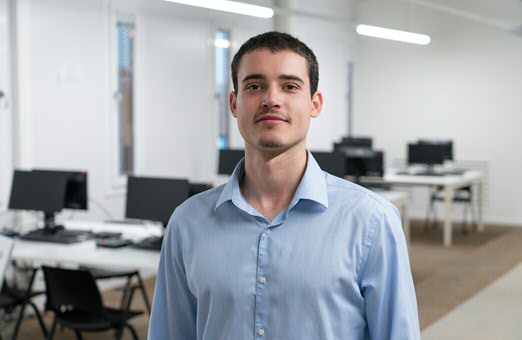
Study Financial Management in Groningen to gain the knowledge and skills necessary for a successful career in financial management and become part of the next generation of financial decision-makers.
Are you aiming for a career in
finance and looking for a programme that prepares you to make
informed financial decisions as part of management teams?
The
MSc Financial
Management
offers
the
tools, knowledge,
and global perspective
to succeed in today's fast-paced financial
world.
This programme equips you with the
latest techniques in financial and risk management, along with
advanced academic knowledge and practical skills, helping you
develop the expertise needed to
tackle complex real-world financial
decision-making processes
. The programme is designed to help you
think strategically, explore innovative ideas and apply
research-based methods to address real financial management
challenges. You will learn how to make strategic financing and
investment decisions in dynamic business environments and how to do
so in an ethical and sustainable manner.
Classes are
interactive and
discussion-driven
,
bringing together students from a variety of backgrounds. We value
diverse perspectives and encourage open, thoughtful engagement to
deepen your understanding of financial management in today's world.
In each of our compulsory courses and programme electives,
we
collaborate with
professionals in financial management who deliver lectures and
real-life cases
. Many
courses use a combination of academic and real-life case-based
teaching to practice solving real-world management
problems.
As a graduate, you will be ready to take on roles in financial management in various settings, from start-ups to multinational companies, financial institutions, and consultancy firms. Whether your ambition lies in corporate finance, banking, or asset management, this programme opens doors to exciting opportunities in organisations operating worldwide across both the public and private sectors.
Starting September 2026, MSc International Financial Management becomes MSc Financial Management—with an updated course structure.During the one-year programme, you gain advanced knowledge in several specific fields in financial management.
To specialise in an area of your interest, you can choose from four programme electives, shown in the list of courses below, and a wide variety of general elective courses in topics such as accounting, international banking, inclusive finance, behavioral finance, sustainability in business and economics, energy transition, and many more (check the Ocasys course catalogue for the complete list). You can also specialise in focus areas such as Energy Transition and Climate Change , Leadership and Governance , or Future Prosperity and Sustainability .
For students who want to start in February, please note that the order of the courses below differs. You can go to the Course Catalogue below to check this.| Semesters | ||||
|---|---|---|---|---|
| CoursesCourse Catalog > | 1a | 1b | 2a | 2b |
| Advanced Financial Management (5 EC) | ||||
| Entrepreneurial Finance and Private Equity (programme elective) (5 EC) You can select at least 3 of 4 programme elective courses. | ||||
| Financial Markets and Data Analysis (5 EC) | ||||
| General Electives (10 EC) Please check the course catalogue for an overview of these electives. | ||||
| Financial Intermediation and Banking (5 EC) | ||||
| M&A, Restructuring and Valuation (programme elective) (5 EC) You can select at least 3 of 4 programme elective courses. | ||||
| Treasury and Risk Management (programme elective) (5 EC) You can select at least 3 of 4 programme elective courses. | ||||
| Thesis (20 EC) | ||||
| Financial Analysis and Investments (programme elective) (5 EC) You can select at least 3 of 4 programme elective courses. | ||||
| Programme options |
|---|
| Double Degree Master Financial Management (Milan) (specialization) Are you interested in a career in financial markets, international finance and risk management? The Faculty of Economics and Business (University of Groningen) and the School of Banking, Finance and Insurance, Università Cattolica del Sacro Cuore (Milan, Italy) have joined forces to set up a high-quality, two-year double degree master in the fields of banking, risk and financial management, and international finance. |
| Double Degree Master International Business and Finance (Shanghai) (specialization) Are you interested in an international career in or involving China? Study in Shanghai after your FEB Master's programme in Groningen and gain first-hand knowledge and experience of China and the economy, finance and culture. |
| Leadership and Governance (specialization) The Leadership and Governance focus area provides you with a deep understanding of both macro-level governance frameworks and micro-level leadership processes. This dual approach enables you to understand the broader implications of governance and leadership, while also recognizing the conditions that shape behavior, decision-making and organizational dynamics. |
| Future Prosperity and Sustainability (specialization) Focus on the sustainable developments in our current society by the increasing influence of the Sustainable Development Goals (SDGs) of the United Nations. The upcoming impact of the SDGs force companies to redefine their purpose and seek a path for meaningful contribution. But, what are companies responsible for, and who bears the burden of the consequences? Your skills and knowledge will prepare you to actively contribute to the strategic developments in this dynamic field. |
| Energy Transition and Climate Change (specialization) Focus on the serious changes within the energy sector by dealing with issues such as how firms adapt to renewable energy, how the higher taxes are managed during this transition and how to deal with the weather dependent production of energy systems. Gain the knowledge and skills to shape a sustainable future in this evolving energy sector. |
| Master Internship (specialization) Opportunity to gain work experience by doing an internship in the second semester of your study. You will be rewarded 15 ECTS on top of your programme. Your thesis will be postponed to the third semester. |
You can opt for a double degree master's with our partners at the School of Banking, Finance and Insurance, Università Cattolica del Sacro Cuore (Milan, Italy) or in Fudan University (Shanghai, China).
| Specific requirements | More information |
|---|---|
| previous education |
Below you will see a table with 'transfer options'. Please check the entry requirements for your Bachelor's degree (from a research university of a university of applied sciences). If your degree is not mentioned in the table below, you can still apply via a Pre-Master's programme. For information on application and entry requirements, please check https://www.rug.nl/feb/premaster. The information about entry requirements is an indication of your admissibility. Every application will be reviewed individually by the Admissions Board so the admission decision may differ from the indication in this table. |
| Study programme | Organization | Transition |
|---|---|---|
| Business Administration | Erasmus University Rotterdam | No additional requirements |
| Economics and Business Economics | Erasmus University Rotterdam | No additional requirements |
| Econometrics and Operations Research | Erasmus University Rotterdam | No additional requirements |
| Fiscale Economie | Erasmus University Rotterdam |
Via a pre-master with a maximum of Via a Pre-Master's with a maximum of 30 EC. More information: https://www.rug.nl/feb/education/study-programmes/pre-msc/ |
| International Business Administration | Erasmus University Rotterdam | No additional requirements |
| Study programme | Organization | Transition |
|---|---|---|
| Public Administration Science | Leiden University |
Via a pre-master More information:Via a Pre-Master's with a maximum of 30 EC for profile Economics, Public Administration and Management. Other profiles via a Pre-Master's of 45 EC. More information: https://www.rug.nl/feb/education/study-programmes/pre-msc/ |
| Computer Science | Leiden University |
No additional requirements More information:For profile Informatica & Economie. |
| Study programme | Organization | Transition |
|---|---|---|
| Economics and Governance | Wageningen University |
Via a pre-master More information:Via a Pre-Master's with a maximum of 30 EC. More information: https://www.rug.nl/feb/education/study-programmes/pre-msc/ |
| Management and Consumer Studies | Wageningen University |
Via a pre-master More information:Via a Pre-Master's with a maximum of 30 EC. More information: https://www.rug.nl/feb/education/study-programmes/pre-msc/ |
| Study programme | Organization | Transition |
|---|---|---|
| Fiscale Economie | Maastricht University |
Via a pre-master with a maximum of Via a Pre-Master's with a maximum of 30 EC. More information: https://www.rug.nl/feb/education/study-programmes/pre-msc/ |
| International Business | Maastricht University | No additional requirements |
| Business Engineering | Maastricht University | No additional requirements |
| Economics and Business Economics | Maastricht University | No additional requirements |
| Econometrics and Operations Research | Maastricht University | No additional requirements |
| Business Analytics | Maastricht University | No additional requirements |
| Global Studies | Maastricht University | No additional requirements |
| Study programme | Organization | Transition |
|---|---|---|
| Fiscale Economie | University of Amsterdam |
Via a pre-master with a maximum of Via a Pre-Master's with a maximum of 30 EC. More information: https://www.rug.nl/feb/education/study-programmes/pre-msc/ |
| Business Analytics | University of Amsterdam | No additional requirements |
| Business Administration | University of Amsterdam | No additional requirements |
| Actuarial Science | University of Amsterdam | No additional requirements |
| Economics and Business Economics | University of Amsterdam | No additional requirements |
| Econometrics and Data Science | University of Amsterdam | No additional requirements |
| Study programme | Organization | Transition |
|---|---|---|
| Fiscale Economie | Tilburg University |
Via a pre-master with a maximum of Via a Pre-Master's with a maximum of 30 EC. More information: https://www.rug.nl/feb/education/study-programmes/pre-msc/ |
| International Business Administration | Tilburg University | No additional requirements |
| Economie | Tilburg University | No additional requirements |
| Econometrics and Operations Research | Tilburg University | No additional requirements |
| Entrepreneurship and Business Innovation | Tilburg University | No additional requirements |
| Study programme | Organization | Transition |
|---|---|---|
| Business Analytics | VU University Amsterdam |
Via a pre-master More information:Via a Pre-Master's with a maximum of 30 EC. More information: https://www.rug.nl/feb/education/study-programmes/pre-msc/ |
| Business Administration | VU University Amsterdam | No additional requirements |
| Economics and Business Economics | VU University Amsterdam | No additional requirements |
| International Business Administration | VU University Amsterdam | No additional requirements |
| Econometrics and Operations Research | VU University Amsterdam | No additional requirements |
| Study programme | Organization | Transition |
|---|---|---|
| Sociology | University of Groningen |
Via a pre-master with a maximum of You need to first complete the 45 EC (or less) Pre-Master's programme. For information about the Pre-MSc application and entry requirements, please check https://www.rug.nl/feb/premaster. |
| Industrial Engineering and Management | University of Groningen |
Additional requirements More information:For students with completed courses: Financial Accounting and International Financial Management. |
| International Business | University of Groningen | No additional requirements |
| Econometrics and Operations Research | University of Groningen | No additional requirements |
| Psychologie (NL) | University of Groningen |
Via a pre-master with a maximum of You need to first complete the 45 EC (or less) Pre-Master's programme. For information about the Pre-MSc application and entry requirements, please check https://www.rug.nl/feb/premaster. |
| Business Administration | University of Groningen | No additional requirements |
| Economics and Business Economics | University of Groningen | No additional requirements |
| Study programme | Organization | Transition |
|---|---|---|
| Business Administration | Nyenrode New Business School | No additional requirements |
| Accountancy | Nyenrode New Business School | No additional requirements |
| Study programme | Organization | Transition |
|---|---|---|
| Economics and Business Economics | Utrecht University | No additional requirements |
| Study programme | Organization | Transition |
|---|---|---|
| International Business Administration | University of Twente | No additional requirements |
| Study programme | Organization | Transition |
|---|---|---|
| Business Administration | Radboud University Nijmegen | No additional requirements |
| Economics and Business Economics | Radboud University Nijmegen | No additional requirements |
Students with a Dutch diploma can apply directly to Studielink. More information on the steps to apply .
| Type of student | Deadline | Start course |
|---|---|---|
| Dutch students | 01 May 2026 | 01 September 2026 |
| 15 October 2026 | 01 February 2027 | |
| 01 May 2027 | 01 September 2027 | |
| 15 October 2027 | 01 February 2028 | |
| EU/EEA students | 01 May 2026 | 01 September 2026 |
| 15 October 2026 | 01 February 2027 | |
| 01 May 2027 | 01 September 2027 | |
| 15 October 2027 | 01 February 2028 | |
| non-EU/EEA students | 01 May 2026 | 01 September 2026 |
| 15 October 2026 | 01 February 2027 | |
| 01 May 2027 | 01 September 2027 | |
| 15 October 2027 | 01 February 2028 |
| Specific requirements | More information |
|---|---|
| previous education |
To be eligible for admission to this Master, you need to hold an academic Bachelor's or Master's degree from a research university in one of the following - or closely related - fields: Business Economics, Business Administration, Economics and Business Economics, International Business, Technology Management. To assess whether your educational/academic background meets the specific programme requirements, we will consider the level and curriculum of your previous studies. For more information, please visit: https://www.rug.nl/feb/apply-msc. If you have any questions concerning admission to this programme, please contact our Admissions Office: https://www.rug.nl/admissions. |
| language test |
IELTS Academic overall score 6.5 (Speaking 6, Writing 6.5); TOEFL internet-based overall score 90 (Speaking 20, Writing 24); Cambridge C1 Advanced or C2 Proficiency (overall score 176, Speaking 169, Writing 176); LanguageCert Academic: overall score 70 (min. 65 in Speaking, 70 in Writing); Pearson PTE Academic (min. 56 in Speaking, 70 in Writing). |
| other admission requirements |
Not meeting the pre-education requirements for direct entry? Please read more about our pre-Master programmes . |
Students have to apply via Studielink and the Progress Portal (replacing the previous system, Online Application System OAS) of the University of Groningen. After you apply for the programme of your choice, the Admissions Office will evaluate your educational background and assess your eligibility. Your application will be assessed on an individual basis. More information on how to apply.
| Type of student | Deadline | Start course |
|---|---|---|
| Dutch students | 01 May 2026 | 01 September 2026 |
| 15 October 2026 | 01 February 2027 | |
| 01 May 2027 | 01 September 2027 | |
| 15 October 2027 | 01 February 2028 | |
| EU/EEA students | 01 May 2026 | 01 September 2026 |
| 15 October 2026 | 01 February 2027 | |
| 01 May 2027 | 01 September 2027 | |
| 15 October 2027 | 01 February 2028 | |
| non-EU/EEA students | 01 May 2026 | 01 September 2026 |
| 15 October 2026 | 01 February 2027 | |
| 01 May 2027 | 01 September 2027 | |
| 15 October 2027 | 01 February 2028 |
As a graduate, you will be ready to take on roles in financial management in various settings, from start-ups to multinational companies, financial institutions, and consultancy firms. Whether your ambition lies in corporate finance, banking, or asset management, this programme opens doors to exciting opportunities in organisations operating worldwide across the public and private sectors.

The Faculty of Economics and Business also offers the MSc Finance. The key difference between the programmes is the management orientation. The MSc Financial Management is a programme that teaches management skills and knowledge that are applied in financial roles, in financial firms, small and large companies, and government and consulting organisations. You will receive rigorous training in working with data and models, with an emphasis on management applications. You learn to solve real-world problems. This is emphasised by the cooperation with a professional in financial management in each course and the use of case study teaching. The programme is suited for students with a business or management background.

The master's caught my attention because it covers not only corporate finance but also includes risk management, financial accounting, and analytical and quantitative skills. It blends finance with management, instilling analytical thinking. It's more than just numbers; it's about analyzing and planning the next steps. The programme also provides a global perspective on the financial market. I aspire to work in the banking industry, and IFM prepares me thoroughly for this field. All courses offer essential aspects for my future career. Beyond practical and technical knowledge, the programme enhances my critical, creative, and problem-solving thinking, focusing on solutions.

The programme captivates me with its diverse curriculum, problem-solving focus, and international market orientation. It equips students with analytical skills for addressing global challenges in multinational corporations, a valuable asset for international firms. My participation in the Sustainable Society Focus Area, delving into contemporary developments and corporate-society dynamics, aligns with the growing emphasis on ethics and sustainability, enhancing my future career prospects. I firmly believe that my acquired knowledge in transaction evaluation, financial analysis, stakeholder considerations, and ESG/CSR practices is exceptionally valuable in today's business landscape.

I chose to study this Master's programme, because one of the unique features is the opportunity to do a Double Degree programme, allowing you to study in both Groningen and Milan. What I value most about it are its diverse opportunities. The programme's flexibility allows internships, studying in Milan through the DDM programme, and a valuable job market preparation, including a Career Week, where you engage with potential employers. Furthermore, guest lectures, real-life cases, and in-class projects enhance practical career understanding. Additionally, the mandatory courses greatly emphasize sustainability and digital business, fostering awareness and practical application. I believe the knowledge gained in this programme will be a solid foundation for effectively adapting to real-world work situations.
Last but not least, Groningen is a beautiful historic city with a large student community and is also relatively affordable compared to other Dutch cities.